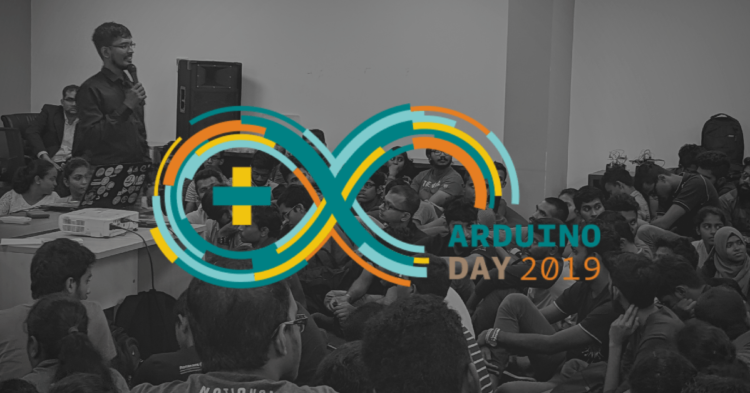Wait, Arduino Day?
As the name implies, Arduino Day is where communities from around the world get together in celebration of Arduino. The 16th of March, 2019 marked 14 years of Arduino with Sri Lanka taking part in the celebrations as well. Organized by Thingerbits, along with the Ministry of Digital Infrastructure and Information Technology the Sri Lankan edition kicked off at the ministry premises.

The aim of the event was primarily to serve as an awareness session on Arduino and several related technologies and initiatives. These included STEM education, smart classrooms, AI, IoT, and 3D printing.
STEM Education
The first session for the day was on STEM education and was conducted by Dr. Lochndaka Ranathunga, Senior lecturer at the University of Moratuwa. STEM is one of modern education’s key focus areas. Even in Sri Lanka, there are efforts to integrate the concept within the education system.
For those of you lost, STEM refers to the idea of educating students in four specific disciplines – Science, Technology, Engineering, and Mathematics. This would take an integrated approach where they are taught cohesively via real-world applications, as compared to separate subjects. The concept essentially takes the form of a blended learning environment.

Part of STEM education is to encourage creativity and innovative thinking. According to Dr. Lochandaka, this is where technologies like Arduino can play an active role. Why? Well, for one thing, it’s the size and the low cost of the device itself. This leaves room for a lot of tinkering to come up with interesting solutions.
Of course, now there are already talks of going from STEM to STEAM, with the introduction of Arts into the mix. The idea here is to improve and emphasize the creative aspects of STEM education.
Smart classrooms
We’ve been hearing about these for quite a while now. Some time back, smart classrooms were all the hype. Come 2019, these initiatives are looking at expanding beyond a mere proof of concept. Klassmate is one of them.
At Sri Lanka’s edition of Arduino Day 2019, the team from Klassmate provided an overview of the concept and different methodologies implemented in executing smart classrooms.

At the heart of it, this approach would make the typical classroom interactive and entertain the students. Thus, encouraging them towards education than driving them away. But what makes smart classrooms attractive is the many opportunities it leaves open for education. For example, think VR field trips.
But as we’ve mentioned before, there are quite a few challenges that need tackling if the concept is to succeed in the long run. But if initiatives like the one in Sri Jayawardenapura Kotte School are any indication, it looks to be heading in the right direction.
AI and IoT
AI is much more than mere discussions today. From Nvidia’s affordable AI computer, to Google’s Pixel phone camera optimizations, AI is becoming a key component in many of our modern products and services.
These days it’s becoming increasingly impossible to walk into anything even remotely tech-based without hearing about AI and IoT. But still, it’s a discussion that needs to be carried forward with the aim of taking the next step.

The Internet of Things follows a similar path to that of the attention and focus AI is getting. But It’s not just the many industrial opportunities. Thanks to technologies like Arduino and Raspberry Pi, IoT implementations are accessible to almost everyone.
3D printing on the other hand is a bit tricky, particularly for Sri Lanka. Like AI and IoT, 3D printing also offers its own capabilities and opportunities for the future. Even in Sri Lanka, 3D printing is being used to preserve history. So there’s obviously potential. But the high expenses limit this potential impact on the market.
Words from the Minister
Towards the latter part of the event, the minister of Digital Infrastructure and Information Technology, Ajith P. Perera, addressed the gathering. He briefed on what the role of his ministry is with regard to enabling the economic growth of the country. He primarily focused on the ePopulation registry, the Sri Lankan government’s ambitious project.

Following the minister’s words, Arduino Day moved on to the final session of the day, the Arduino contest. Here, each team presented their creation to the audience. These presentations ranged from line-following robots to interactive guns that act as controllers for FPS games. The first place was awarded an Alexa-based voice solution with the interactive gun coming in at second place. With that ended Arduino Day 2019 Sri Lanka edition.






GIPHY App Key not set. Please check settings